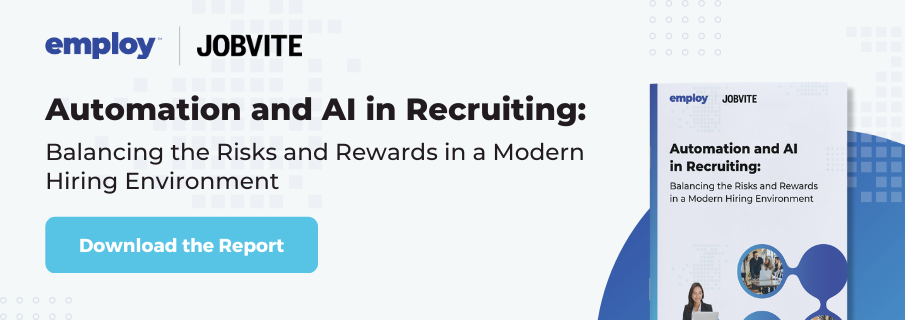From flagging the appropriate candidate to improving experiences for others, here are 12 responses to the question, “What are the most interesting ways ChatGPT might impact recruiting and hiring?”
Help brands flag suitable candidates

We could leverage ChatGPT to assist with the initial screening and assessment of job candidates. ChatGPT can analyze large volumes of text data, provide insights, and make intelligent recommendations based on that analysis. This is particularly useful in the early stages of recruiting when companies are typically inundated with many resumes and applications.
By integrating ChatGPT into their hiring process, you can leverage its natural language processing capabilities to quickly and efficiently screen job candidates based on their resumes, cover letters, and other application materials.
ChatGPT can also help identify critical skills, experiences, and qualifications required for a particular job and flag candidates that meet those criteria.
Zach Goldstein, CEO and Founder, Public Rec
Create AI-written cover letters

One of the most time-consuming parts of a job application is writing a cover letter. Prospective employees may choose to use ChatGPT to help them create these letters faster, so they can apply for more jobs in a day.
A recruiter’s job is then to discern those applicants who have put genuine thought and time into their cover letter — or, perhaps, who have leaned on AI for support, but brought their own ideas and voice to the process as well. You want your employees to work smart, after all. But you also want to hire people, not bots.
Matthew Stibbe, CEO, Articulate Marketing
Set up interactive chatbots to guide job seekers

ChatGPT’s natural language processing capabilities could create interactive chatbots or virtual assistants that help guide job seekers through the application process, providing personalized support and help every step of the way.
For example, a chatbot could ask candidates questions about their qualifications, experience, and interests in order to recommend jobs that are a good fit for their skills and career goals. It could also provide information about the company culture, benefits, and other aspects of the job that might interest candidates.
During the application process, the chatbot could help candidates complete each step, providing guidance on how to fill out forms, upload documents, and answer specific questions.
It could also provide real-time feedback on the status of their application, letting candidates know when their application has been received when they’re being considered for the job, and when a decision has been made.
Luciano Colos, Founder and CEO, PitchGrade
Normalize video introductions

As a recruiter, I’m already seeing the effects of ChatGPT in the industry. The biggest change?
ChatGPT is reducing the value of cover letters. As more and more candidates are using AI to put together an introduction, I’m having to find better ways to get to know applicants beyond their skill set and education.
For me, this means a renewed focus on things like emotional intelligence tests and personality evaluations. Video meet-and-greets are another great alternative.
It’s a welcome change on both sides of the hiring process; candidates have long told me that cover letters are the worst part of job hunting, and personally, I’ve never found them particularly illuminating.
Rob Reeves, CEO and President, Redfish Technology
Hasten the onboarding process

While there are some concerning ways that ChatGPT could impact hiring negatively — such as increasing biases and restricting access to minority candidates — there are also some positive applications of ChatGPT that we can expect, too.
One application that I am very much looking forward to is a chatbot that can help new hires get onboarded more quickly. If the tool is trained on the entire company’s policies, communications, processes, and values, it can be a perfect sounding board for new employees who want to get their questions answered and get up to speed faster without bothering their busy colleagues too much.
Brett Ungashick, CEO and CHRO, OutSail
Reduce human bias in hiring

ChatGPT has the potential to greatly impact the recruiting and hiring process by helping to reduce bias. One way it can achieve this is by identifying biased language in job postings and other recruitment materials.
By analyzing the language used, ChatGPT can flag gender-specific language or other potentially biased phrasing that may deter certain groups of candidates from applying. Additionally, ChatGPT can provide suggestions for more inclusive language to replace biased language in job postings and resumes, thus making them more appealing to a wider pool of candidates.
Another way ChatGPT can reduce bias is by conducting blind resume screening, which involves removing personal information from resumes to reduce the potential for unconscious bias based on factors such as name, age, or gender. Using AI language models like ChatGPT in the recruiting and hiring process has the potential to greatly improve diversity and inclusivity in the workforce.
Kimberley Tyler-Smith, VP, Strategy and Growth, Resume Worded
Generate sourcing, nurturing, and interviewing ideas

In my experience with ChatGPT, it is still at times inaccurate, or rather it depends on how you phrase queries for it to be at its most effective. I currently use it for coming up with ideas on interview questions and for coming up with the framework for job postings. It’s a great tool for brainstorming a set of interview questions for a specific job posting.
In the future, I think ChatGPT might provide generated interview questions, job postings, and help with the onboarding process, provided the accuracy continues to improve. Generating interview questions isn’t something it can’t do now, but with the job postings, I find myself having to double-check its content for accuracy, as several times it has either not understood the query or returned inaccurate info about a certain job.
As it stands now, it is great for helping a recruiter or HR person develop ideas and get the creative juices flowing. I expect this to continue to get better soon.
Brian Clark, CEO and Marketing Director, United Medical Education
Deliver company information

AI is already a major part of the recruitment process. There are applicant tracking systems and chatbots being used to speed up resume screening and initial candidate engagement. One way that ChatGPT can make an impact here is by taking over the initial screening interviews.
The initial screening interviews, which can be pretty boring, can now turn into something fun and can be a two-way street as well. Candidates can learn more about the company culture and job responsibilities, and the answers won’t sound copy-pasted from the brochure.
Meanwhile, ChatGPT can also analyze and interpret their responses to figure out whether they meet the requirements to go to the next step of the interview.
I wasn’t very happy with how the applicant tracking systems were taking over the recruitment process. Sometimes, they can reject a candidate just because of unconventional formatting or design. With ChatGPT in the playground, all the previous AI recruitment tools being used can be more polished.
Andreas Grant, Founder, Networks Hardware
Shift towards gamified pre-employment assessments

In the age of ChatGPT, text is cheap. Historically, pre-employment assessments have been largely text-based, relying on multiple-choice questions and rich text information. ChatGPT has already shown itself able to answer these questions with frightening accuracy, making traditional pre-employment tests terminally vulnerable to cheating.
Gamified assessments, however, employ game mechanics that are substantially more complex. They use these mechanics to assess spatial reasoning, processing speed, 3D rotation, prioritization, and decision-making, rendering ChatGPT useless.
Consequently, I foresee a massive shift toward ChatGPT-proof gamified assessments in the pre-employment testing space, along with a rapid discontinuation of text-based assessments soon.
Ben Schwencke, Business Psychologist, Test Partnership
May replicate inherent bias

Using ChatGPT in hiring/recruitment can hurt minorities, if the data used to train the algorithm has inherent biases against certain demographics. In such instances, the algorithm may replicate these biases in its decision-making process, resulting in minority candidates being overlooked or unfairly eliminated from the hiring process.
Moreover, ChatGPT algorithms may not recognize and account for the nuances of language and cultural differences that can be relevant in hiring decisions, leading to misinterpretation or misunderstanding of a candidate’s qualifications, experience, and communication style, and thus unfairly disqualifying minority candidates.
Organizations should ensure that their ChatGPT algorithms are ethically designed and validated to ensure fair and unbiased hiring practices. Human interaction is also essential to account for the nuances that algorithms may not be able to detect or assess.
Lilia Koss, Community Manager, Facialteam
Rewrite company pitches with the candidate in mind

ChatGPT can rewrite company pitches in candidate-friendly language. When you’re recruiting, you’re pitching your company. Many times, these pitches come across as either too vague or too complex.
To really grab a potential candidate’s attention, it needs to be written clearly and concisely. It should emphasize your company culture, explain the role well, and detail what you’re looking for in a candidate. ChatGPT can even consider what candidates want to read when they’re researching open positions to write a pitch tailored to them.
Andrew Meyer, CEO, Arbor
Enhance the candidate experience

ChatGPT can have a significant impact on recruiting and hiring by improving the candidate experience. ChatGPT can communicate with prospects in a timely and tailored manner throughout the employment process, from initial outreach through a job offer.
I think this can assist in keeping candidates motivated and informed, lowering the risk of losing top talent to other opportunities.
ChatGPT may also answer applicant inquiries and provide feedback on their application status in a faster and more effective manner, which can contribute to a better candidate experience. Companies can also strengthen their employer brand to attract more top talent.
Jeff Romero, Founder, Octiv Digital
Check out our Automation and AI in Recruiting eBook today to discover how you can leverage artificial intelligence and automated workflows to improve your hiring efforts.





